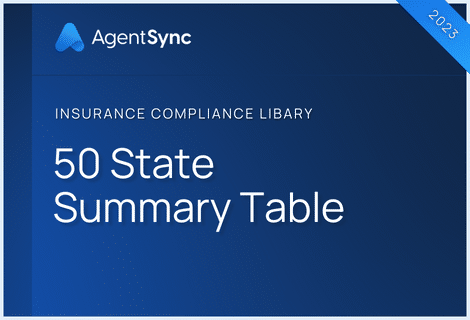

Washington alerted the industry the state would no longer allow carriers to backdate their appointments beginning in April 2023.
The announcement raised questions about Just-In-Time (JIT) appointments, what they are, and whether Washington’s appointment process allows for JIT nuances.
So, instead of dumping unwarranted commentary about our hottest of hot takes, we spoke with Jeff Baughman, Producer Licensing & Oversight Program Manager of the Washington State Office of the Insurance Commissioner, to get some clarity. Following is a broad distillation of our conversation and some nuances of the state’s appointment specifics.
As Baughman pointed out, this change is one of procedure, not law or regulation, and was driven by a trend of insurance carriers holding off on submitting an appointment (which Washington accepts via the National Insurance Producer Registry (NIPR)) until well after they had signed a contract or accepted business from a downstream producer or agency.
“The only thing we really changed is that, when you appoint with NIPR, you can only use today’s date,” said Baughman, “Unfortunately, before, the industry abused this to the nth degree. You have somebody who signed a contract and four months later tried to submit a piece of business, and then they would try and backdate to when the contract was signed.”
Yet, does ending a carrier’s ability to backdate an appointment also end the carrier’s ability to use JIT appointments?
What is Washington’s insurance appointment law?
Although the change doesn’t affect the law, let’s go ahead and pop the legalese in here because we’re pedantic and if you work in insurance you are too:
What the Washington law (RCW 48.17.160) says:
(1) An insurance producer or title insurance agent shall not act as an agent of an insurer unless the insurance producer or title insurance agent becomes an appointed agent of that insurer. An insurance producer who is not acting as an agent of an insurer is not required to become appointed.
(2) To appoint an insurance producer or title insurance agent as its agent, the appointing insurer shall file, in a format approved by the commissioner, a notice of appointment within fifteen days from the date the agency contract is executed or the first insurance application is submitted, whichever is earlier.
(3) Upon receipt of the notice of appointment, the commissioner shall verify within a reasonable time, not to exceed thirty days, that the insurance producer or title insurance agent is eligible for appointment. If the insurance producer or title insurance agent is determined to be ineligible for appointment, the commissioner shall notify the insurer within ten days of the determination.
(4) An insurer shall pay an appointment fee, in the amount and method of payment set forth in RCW 48.14.010, for each insurance producer or title insurance agent appointed by the insurer.
(5) Contingent upon payment of the appointment renewal fee as set forth in RCW 48.14.010, an appointment shall be effective until terminated by the insurer, insurance producer, or title insurance agent and notice has been given to the commissioner as required by RCW 48.17.595.
Straightforward! Clear! Or, maybe not.
“Keep in mind, statutes are the actual law, regulations are interpretations of what’s stated in the law. We clarify in regulation,” Baughman said. “You won’t find anything in statute about affiliations, nothing, but we are an affiliation state.”
So, it’s not enough to read the law – we also have to dig into the state regulator’s interpretation of the legalese. With the layer of regulatory interpretation on top of the law, and the tidbits of procedures and rules that add their own coloring to appointments, let’s dig in on some of the further clarifications we got from Baughman.
1. Washington is a Just-In-Time Appointments state, period
Just-In-Time provisions are based on an NAIC model that allows carriers some latitude to decide to hold off until a producer has submitted business before filing an appointment with the state and paying a fee. Now, that is a broad definition, and each state has a variation on that theme.
You’ll notice, the Producer Licensing Model Act’s treatment of appointments (Section 14.B) states:
“To appoint a producer as its agent, the appointing insurer shall file, in a format approved by the insurance commissioner, a notice of appointment within fifteen (15) days from the date the agency contract is executed or the first insurance application is submitted.”
And you’ll also notice Washington’s rule is similar, but there’s a key phrase at the end that makes Washington’s rule slightly different from the model.
“To appoint an insurance producer or title insurance agent as its agent, the appointing insurer shall file, in a format approved by the commissioner, a notice of appointment within fifteen days from the date the agency contract is executed or the first insurance application is submitted, whichever is earlier.” (Our emphasis added.)
As Baughman puts it, this nuance still gives carriers the ability to pick and choose what trigger they would like to use for an appointment. But Washington’s regulatory culture is such that giving carriers the ability to pick and choose a timeframe for an appointment seemed more confusing than helpful.
“Regulators get a little skittish when you talk about ‘Just-In-Time,’ because in some states it means one thing and in others it means another,” said Baughman. “Some states say the carrier can choose, and the insurance company has the option to get the contract signed and then wait until a producer submits their first piece of business, possibly months later. Not in Washington.”
2. Washington accepts the earlier of a carrier contract or business submission as the trigger for the 15-day JIT appointment provision
Whether a carrier signs a contract with a producer or agency, or whether they accept a business submission, whichever happens first will trigger the 15-day appointment period.
“In other states, if a carrier brings you into a contract in January and you don’t submit your first piece of business until August, they have 15 days from either of those dates? We thought that was confusing,” said Baughman. “From a purist standpoint, the statute says if you represent an insurance company in a transaction, you have to be appointed. So, we added the appointment trigger and 15-day timeline to whichever comes earlier.”
Baughman has two decades of experience with a carrier on the industry-facing side of the business, so he also frankly noted it’s unlikely a carrier will accept business from someone who doesn’t also have a contract. Yet, they have that choice.
3. The appointment date will be the date the appointment request is submitted
The practice of backdating the appointment, from the Washington standpoint, drove widespread abuse and confusion among carriers. At one point, Baughman described what it was like before the state was able to implement a mechanism to limit the timeframe of backdating: “Carriers backdated by months, not days,” he said.
The state worked with NIPR to tighten controls and ensure carriers could only backdate by weeks. Yet, even then, the Washington market conduct staff said their team was reviewing appointment requests with evidence that the contracts had effectively been in place for months already. Hence, the full removal of any backdating capabilities.
This is, of course, an area of nuance because there are also situations where carriers hold a contract with an agency or producer that is active in other states and only becomes effective in Washington when that firm or producer brings in a Washington-based client. In that case, said Baughman, whichever happens first – the business submission or the addition of Washington to the carrier’s contract – will act as the trigger for the 15-day appointment period.
With same-day date stamping, carriers that issue a contract and submit a carrier appointment notice to the state can also then have the confidence that, assuming state approval of the producer’s appointment, the producer is in good standing to sell. To put it another way, a carrier executes a contract and applies for an appointment the same day. The next day, their newly contracted producer sells a policy. The appointment date will pre-date that business submission.
4. Carriers don’t necessarily need to appoint individual producers who are affiliated with downstream agencies
Another area of nuance is that Washington supports umbrella appointments, where an agency’s downstream producers are all covered under the agency’s appointment.
Though reading the state law might lead one to believe that every producer needs a direct appointment from the carrier, Baughman said this is an area where regulatory guidance clarifies the state law.
“When an agency is licensed, they are required to name a DRLP who is also affiliated at the time the license is issued. Again, if the insurer signs the contract with the agency, the trigger is met [and the carrier must appoint the agency within 15 days],” said Baughman. “The agency would be appointed and the affiliated DRLP would be covered by that agency appointment, and it is not necessary to directly appoint the DRLP or any additionally affiliated producers that the agency would add later.”
So, if you are a carrier, if your downstream agency affiliates its agents in the state of Washington through the state portal, then you need only appoint the agency itself.
If JIT appointments are meant to save a bundle in appointment costs, then knowing and applying this information is at least as valuable if not more so!
5. Washington only allows “brokerage” (selling insurance without an appointment) for resident producers (and even then they don’t love it)
Broker regulation is a source of fascination on the AgentSync blog, so of course we want to know: What does brokerage look like in Washington?
There’s a provision in Washington law that appears to allow for the practice of broker, where a resident insurance producer acts as an agent of the insured and not as an agent of the carrier:
“(1) Every resident insurance producer licensed under this chapter on or after July 1, 2009, who places insurance either directly or indirectly with an insurer with which the insurance producer is not appointed as an agent must maintain in force while so licensed a bond in favor of the people of the state of Washington or a named insured such that the people of Washington are covered by the bond, executed by an authorized corporate surety approved by the commissioner, in the amount of two thousand five hundred dollars, or five percent of the premiums brokered in the previous calendar year, whichever is greater, but not to exceed one hundred thousand dollars total aggregate liability. The bond may be continuous in form, and total aggregate liability on the bond may be limited to the required amount of the bond. The bond must be contingent on the accounting by the resident insurance producer to any person requesting the resident insurance producer to obtain insurance, for moneys or premiums collected in connection therewith.”
According to Baughman, this is an area where producers holding themselves as a broker should walk very gingerly.
“The broker doesn’t exist in our world. … Let’s go back to the statute: If you’re acting as an agent of an insurance company, you have to have an appointment or have an affiliation to the agency that has the appointment,” said Baughman.
The provision appears to give resident producers the authority to act as an agent of a client as long as they or their parent agency has an appropriate bond. Yet, Baughman said the standardization in the Producer Licensing Model Act, which Washington adopted in 2009, has more or less ended the role of an insurance broker.
“The market conduct team often has issues with the bond provision because the statute is clear,” said Baughman. “You might have industry terms like ‘wholesale broker,’ ‘retail broker,’ which are commonly used in the non-admitted market, but there’s no provision in statute that even addresses that. They’re all producers.”
The TL;DR: Get your appointments in order
Reading between the lines, a decent course of action for carrier appointments in Washington may be to ensure your agencies are up-to-date on their affiliation practices, and then use the carrier contract as a Just-In-Time appointment trigger to appoint the agency.
“We try to work closely with our licensees and insurance carriers because it’s about education,” said Baughman. “It’s not like we’re waiting behind a bush with a big hammer to jump out and smack you on the head.”
The education-first approach takes a much more lenient perspective toward first-time offenders – Baughman said the state certainly recognizes there’s a difference between a carrier with compliance steps that happened out of order and someone who wrote 17 fake policies to people who didn’t even exist.
If you’re working through the nuances of state regulation on appointments, check out the AgentSync Compliance Library. And if you’re ready to operationalize your cost-savings on compliant and efficient JIT appointments, check out AgentSync.

